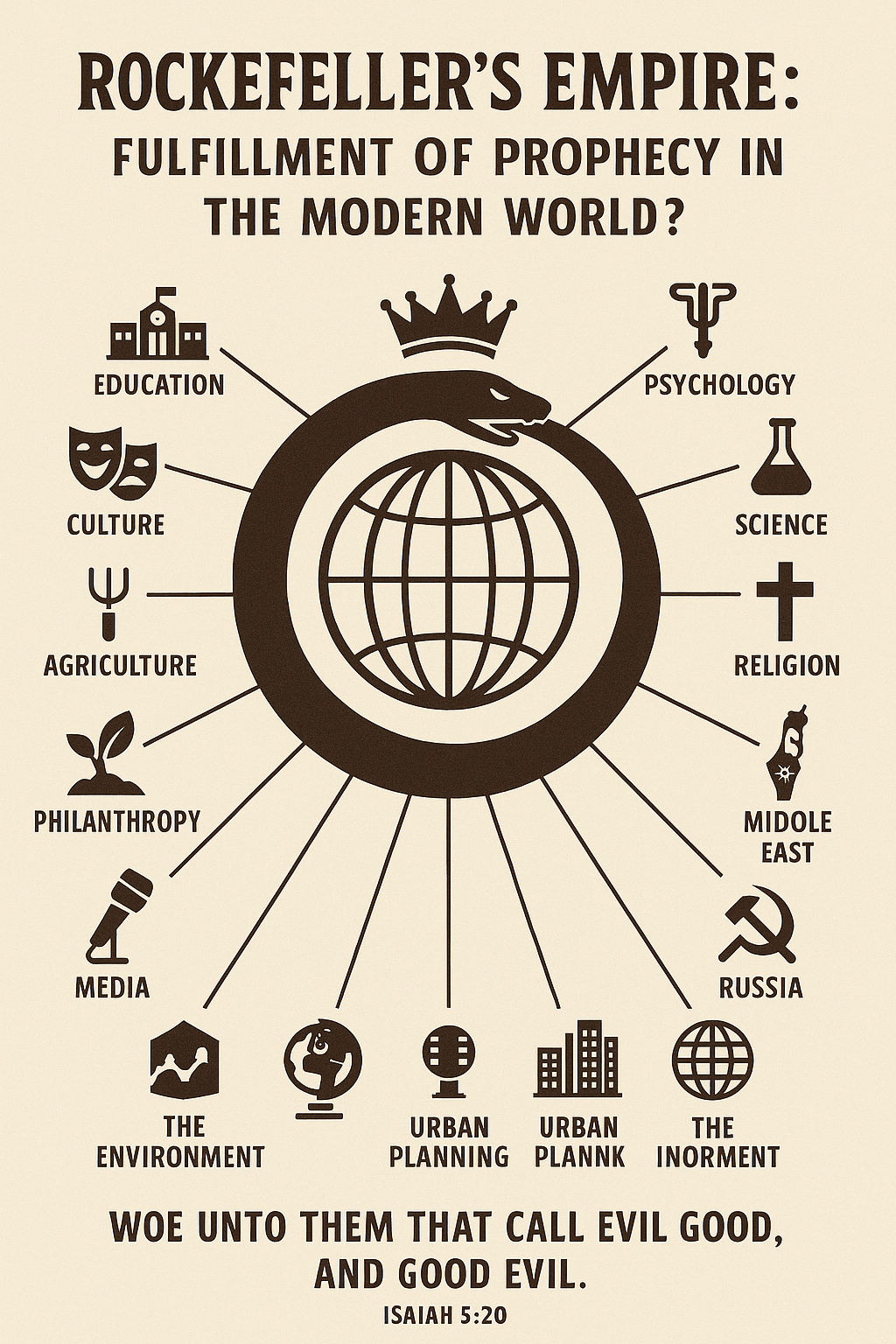A Century of Transformation—Orchestrated from the Top
Since the early 1900s, the Rockefeller family and their vast web of foundations, banks, trusts, and alliances have left their imprint on nearly every aspect of Western—and, increasingly, global—civilization. Their influence reaches across:
Education: Standardized schooling, curricula, and universities shaped to produce compliant citizens and technocratic managers, not free thinkers.
- General Education Board (1902): Funded the restructuring of public schools across the U.S., promoting a “factory model” of education focused on obedience and routine over creativity and critical thinking.
- University Funding: Massive grants to the University of Chicago, Harvard, Columbia, Johns Hopkins, and dozens more shaped curricula, social sciences, and teacher colleges nationwide.
- Textbooks and Standardization: Pushed for national standards, influencing millions of children would learn.
Health & Medicine: Allopathic medicine became the standard, alternative traditions marginalized, the pharmaceutical model institutionalized.
- The Flexner Report (1910): Commissioned by the Rockefeller Foundation, the report “reformed” American medical education—shutting down holistic and homeopathic schools, making allopathic (pharmaceutical) medicine dominant.
- Creation of the AMA: Heavy funding and influence over the American Medical Association and medical accreditation bodies.
- Global Health: Helped found the World Health Organization (WHO), Rockefeller Institute for Medical Research (now Rockefeller University), and guided global vaccination and public health policy.
Psychology & Science: Research, academic disciplines, and even the “scientific consensus” often guided by Rockefeller-funded priorities—sometimes to serve power, not truth.
- Social Engineering: Rockefeller Foundation funded research into psychology, psychiatry, and behaviorism at major universities, backing figures like John B. Watson and B.F. Skinner.
- Eugenics: Sponsored the Eugenics Records Office at Cold Spring Harbor and supported population control policies in the U.S. and abroad.
- Scientific Consensus: Directed funds to guide “acceptable” science, often steering research away from lines that threatened their corporate interests (especially in oil, medicine, and agriculture).
Religion: Reframing faith through ecumenism, social gospel, and the dilution of distinct spiritual voices, funding institutions to mold “acceptable” theology.
- Ecumenical Movement: Major funder of the Federal Council of Churches, World Council of Churches, and National Council of Churches—promoting theological liberalism and interfaith dialogue over traditional orthodoxy.
- Seminaries and Clergy: Endowed chairs and entire seminaries (Union Theological Seminary in New York, for example), influencing the direction of Christian education and doctrine.
- Social Gospel: Advanced a “works-based” gospel (social gospel) focusing on social reform rather than personal salvation or biblical authority.
Government & Policy: Through think tanks, councils, and influence in international institutions, steering national and global policy toward centralization and technocratic control.
- Council on Foreign Relations (CFR): Co-founded and funded as the primary U.S. foreign policy think tank, shaping generations of American diplomatic and economic policy.
- Trilateral Commission & Bilderberg Group: Helped found and fund international policy groups to coordinate elite global governance.
- United Nations: Major Rockefeller funding and donation of land for the UN headquarters; behind the scenes in global governance, including the League of Nations.
Geopolitics & The Middle East (including Israel): Shaping the modern Middle East (including Israel), involvement in Russia’s and China’s opening to Western finance, engineering oil and resource politics.
- Oil and the Middle East: Through Standard Oil (later ExxonMobil, Chevron, etc.), the Rockefellers drove the opening up of the Middle East’s oil reserves, helping redraw borders and set the stage for modern geopolitics.
- Creation of Israel: Supported both the Balfour Declaration and subsequent U.N. efforts for a Jewish state, using influence in British and American policy circles.
- Early 20th Century: Supported “opening up” and “modernizing” of Russia and China, working with governments to build oil, rail, and industrial capacity—sometimes funding both sides of conflicts.
- Cultural Exchange: Promoted “science diplomacy” and education exchange programs to shape the development of elites in these countries.
Culture & Media: Media empires, cultural shifts, art, and public opinion shaped by grants and boardroom power.
- The Arts: Funded the Museum of Modern Art (MoMA), major music, and theater programs—steering American culture toward modernism and cosmopolitan values.
- Media: Board representation and financial stakes in major media companies; influence over news content, narratives, and what’s considered “mainstream.”
Agriculture, Philanthropy, Environment, Urban Planning: The “Green Revolution,” land management, and even urban design reflect Rockefeller priorities.
- Green Revolution: Rockefeller Foundation led the introduction of chemical fertilizers, industrial agriculture, and genetically modified crops in the U.S. and developing world.
- Land-Grant Universities: Funded agricultural research that shifted farming away from traditional methods toward chemical, monoculture farming.
- Philanthropy as Social Engineering: Foundations as tools for permanent power—“giving” with strings that mold society in their image.
- Green Revolution: Rockefeller Foundation led the introduction of chemical fertilizers, industrial agriculture, and genetically modified crops in the U.S. and developing world.
- Land-Grant Universities: Funded agricultural research that shifted farming away from traditional methods toward chemical, monoculture farming.
- “Philanthrocapitalism”: Set the model for modern “strategic philanthropy”—using charitable foundations as vehicles for social engineering, tax avoidance, and perpetual power.
- Influence Networks: Created an interlocking network of foundations (Carnegie, Ford, Gates followed suit) to coordinate policy, education, science, and media worldwide.
- Conservation: Founded and funded major conservation groups (National Parks, Nature Conservancy) but often with strings attached to oil/mineral rights.
- Urban Planning: Supported the development of modern city planning and zoning, sometimes resulting in the displacement of communities and the promotion of car-centric infrastructure (benefiting oil).
Banking & Finance: The Backbone of Empire
Generalization
No sector better reveals the Rockefeller strategy of control than banking. By building, merging, and guiding the world’s most powerful banks and financial institutions, the Rockefellers not only accumulated enormous wealth, but also engineered the rules of the financial system itself—controlling credit, currency, government debt, and global flows of capital.
In essence:
“Give me control of a nation’s money and I care not who makes its laws.” (often attributed to Mayer Amschel Rothschild, but the Rockefellers followed this blueprint.)
Specifics
- Chase Manhattan Bank (now JPMorgan Chase):
- The flagship Rockefeller bank, once the largest private bank in the world, used as a lever for both national and international finance.
- David Rockefeller served as chairman and CEO, meeting with world leaders, shaping international banking policy, and facilitating loans and debt deals that bound nations to New York and London.
- Federal Reserve System:
- The Rockefellers were deeply involved in the creation and operation of the Federal Reserve (1913), the U.S. central bank that sets interest rates and controls the money supply.
- Rockefeller allies attended the infamous Jekyll Island meeting with J.P. Morgan and others, laying the foundation for a privately controlled central banking cartel.
- International Banking & Bretton Woods:
- Through their banks and foundations, the Rockefellers supported the creation of the International Monetary Fund (IMF) and the World Bank after WWII—institutions that would dictate economic policy to the world under the guise of “development” and “stability.”
- Loans, grants, and debt restructuring became tools for influencing or controlling developing nations, often forcing them into compliance with globalist agendas.
- Bank for International Settlements (BIS):
- Rockefeller-connected bankers played roles in the creation and ongoing policy of the BIS—sometimes called the “central bank of central banks”—facilitating coordination among global financial elites.
- Investment in Other Banks and Conglomerates:
- Through trusts and interlocking directorates, the Rockefeller empire reached into Citigroup, Bank of America, and countless regional banks, creating a web of financial control.
Banking Summary
Banking was not just another sector for the Rockefellers—it was the central nervous system of their influence.
By controlling banks, credit, and international finance, they set the terms for business, government policy, and even the fates of nations, fulfilling the prophetic warnings of “merchants of the earth” and secret combinations controlling “all the earth.”
“Evil Good and Good Evil”: The Spiritual Inversion
Many sense that what the Rockefellers helped build is not simply a technocratic system, but a spiritual inversion:
- What once was moral, natural, or sacred is now branded “regressive,” “superstitious,” or “dangerous.”
- What once was unthinkable is normalized through education, media, and policy, turning ancient wisdom upside down (see Isaiah 5:20: “Woe unto them that call evil good, and good evil…”).
Buying Up Armies, Kings, and Kingdoms: Fulfilling Prophecy?
The reference is spot on:
- Daniel 2 & 7, Revelation 17–18, and Book of Mormon (Ether 8:23–26) warn of secret combinations—wealthy powers “buying up armies and navies, kings and kingdoms,” enslaving nations for gain and power.
- The “kings of the earth” become vassals of the merchants and bankers (“the merchants of the earth are waxed rich through the abundance of her delicacies”—Revelation 18:3).
- Rockefeller power often worked behind the scenes—not just through visible politics, but by controlling finance, ideas, and institutions, “buying” loyalty, influence, and outcomes.
What Hasn’t Been Changed?
In practical terms, very little in modern life escapes Rockefeller (and allied elite) influence.
- The only meaningful exceptions are communities and individuals who refuse to sell out, preserve independent thought, cultivate local economies, and hold to spiritual truths that cannot be bought or manipulated.
- Remnants of truth—in faith, tradition, family, land, and conscience—may survive, but must remain vigilant, for the pressure to conform is relentless.
A Warning and a Call
If ever there were a fulfillment of the prophetic pattern of secret combinations corrupting “all the earth,” as foretold in ancient scripture, the 20th–21st century rise of Rockefeller and kindred dynasties stands as a model.
- “For what shall it profit a man, if he shall gain the whole world, and lose his own soul?” (Mark 8:36)
- The call for our age is to discern, resist, and rebuild what is true, good, and beautiful—outside the grip of empire, money, and manipulation.







